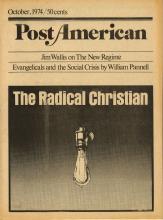In his first public appearance since granting a full and unconditional pardon to Richard Nixon, President Gerald Ford was booed by an angry Pittsburgh crowd carrying signs reading “Justice Died.” Though that sentiment seemed characteristic of the overwhelmingly negative public reaction to the pardoning of the former president, it did miss the point. In this country, justice has been dead for a very long time and the double standard of mercy for the powerful and a punitive “amnesty” for draft-resisters simply demonstrates that little has been changed by the transition of presidents. The initial excitement and confidence in the new administration has now turned to disillusionment and betrayed hopes. This reaction says less about the “newness” of the Ford presidency as it does about the desire, and even need, of the press, the Congress, and the public to put Watergate behind and create a new image even if the reality isn’t there. It seems we have learned little from the Watergate experience about the idolatry of putting our confidence in presidents, governments, and political power generally. The vice-presidential appointment of Nelson Rockefeller, the symbol of the economic and political power that controls this nation, is a further indication that we can expect more of “business as usual” in American politics.
Read the Full Article
To continue reading this article — and get full access to all our magazine content — subscribe now for as little as $4.95. Your subscription helps sustain our nonprofit journalism and allows us to pay authors for their terrific work! Thank you for your support.
Already a subscriber?
Login

